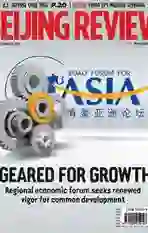How to Liberalize the RMB Exchange Rate
2014-05-09
Sharp depreciation of the renminbi against the U.S. dollar will soon end.
An official of the U.S. Department of the Treasury said the recent depreciation of the Chinese currency could raise “serious concerns”if it signaled a policy shift away from allowing market-determined exchange rates.
A meeting was held between G20 finance ministers and central bank governors on April 10 in Washington, and the International Monetary Fund and World Bank also held their spring meetings in the U.S. capital. Before the meetings were held, the U.S Government needed to clarify its attitude toward the renminbi exchange rate, which had sharply dropped in the first quarter. It mainly focuses on two points: Whether or not the yuans exchange rate has been manipulated by the government, and if the yuans depreciation will cause competitive depreciation by other trading entities to increase exports. The U.S. treasury officials statement was neutral. In fact, no country can cast off the influence of the U.S. Federal Reserve or the U.S. Department of the Treasury during exchange rate reform, be they Japan, Germany or India.
The yuans exchange rate is at a critical point with frequent changes occurring.
Previously, the yuan had depreciated a lot, leaving only a tiny space for further devaluation. In the first quarter of this year, the renminbi dropped 2.6 percent against the U.S. dollar, almost offsetting all of the appreciation that had taken place over the whole year of 2013. Since the end of March, the renminbi exchange rate against the U.S. dollar has ceased unilateral depreciation. Rapid depreciation of the renminbi not only confounded market expectations on the unilateral appreciation of the yuan, but also left more room for Chinas central bank to continue exchange rate reform. On March 17, China widened its yuan trading band from 1 percent to 2 percent.
We should be clear on the fact that further depreciation of renminbi will go against Chinese economic growth. If investors were to lose confidence, there would be large capital outflow, and a sharp drop in the price of domestic assets may lead to a debt crisis. The yuan may then lose its functions as a reserve currency and investment tool, and the yuans internationalization process would fail.
The space for the unilateral appreciation of the yuan is also not large. Chinas central bank officials have repeated many times that as Chinas trade surplus reduces, China will not have sufficient trade surplus to further push up the yuans exchange rate.endprint
Up one minute, down the next, the yuans exchange rate confuses the market. When China widened the yuans trading band in the past, the fluctuation narrowed instead. For example, when China allowed its renminbi exchange rate to rise or fall 1 percent as of April 2012, the yuan continued unilateral appreciation. The new round of exchange rate fluctuation will not only cut the earnings of hedging funds, but also impose a big challenge on Chinas export-oriented companies. According to an April 7 report by Yiwu Business News, an official of Yiwu Customs said if the yuans exchange rate goes up 1 percent, the profits of cotton and textile industry will drop 12 percent and those of garment industry will go down 13 percent. This trend will reverse if the renminbi depreciates.
Liberalization of the renminbi exchange rate is a major task for Chinas market-oriented reform. China is following Germanys road of exchange rate reform while hoping not to repeat the mistakes Japan made in its reform. Under pressure from the United States, the Japanese yen has appreciated rapidly since 1971. To offset the adverse impact toward exports, the Japanese central bank had to cut its interest rates again and again, intensifying asset bubbles. After the interest rate rose in 1989, the asset bubbles collapsed.
When a country has a huge amount of foreign exchange reserve and huge trade surplus, as China does, it has a domestic impetus for the exchange rate to go up and its economy is strong enough to offset the adverse impact of currency appreciation. The exchange rate must be liberalized when it should be, in order to avoid missing out on a prime opportunity. When the exchange rate goes up, it is wrong to adopt a low interest rate, which will encourage a large amount of low-interest capital to come into the real estate market.
The liberalization of the renminbi exchange rate is like walking on a tightrope. China should follow the German model, widening trading band of its exchange rate when the economy can tolerate and strictly controlling the interest rate so as to prevent the asset price bubbles caused by low interest rates. As opposed to Japan and Germany, China is not making satisfactory progress in its economic restructuring. People are concerned whether or not the poor quality of large enterprises under government protection can stand the pain brought by the exchange rate reform.endprint
